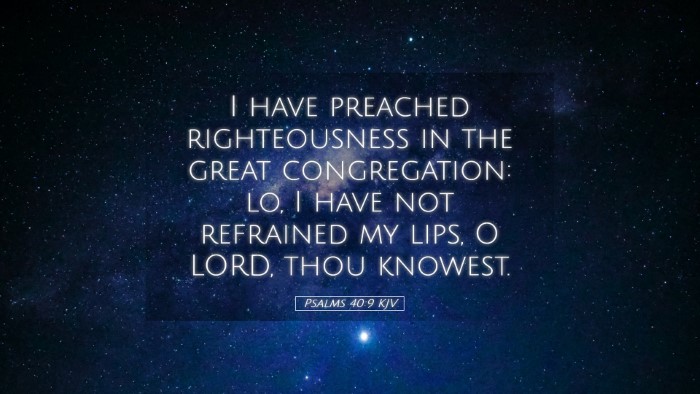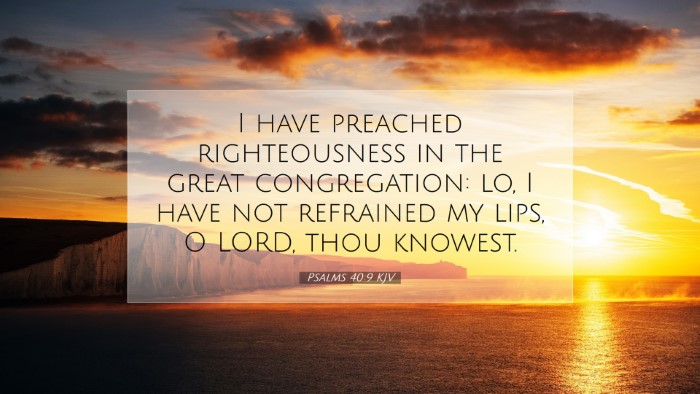Psalms 40:9 Commentary
Verse: "I have proclaimed glad tidings of righteousness in the great congregation; behold, I will not restrain my lips, O LORD, You know." (Psalms 40:9)
Introduction
This verse encapsulates a profound expression of the psalmist's commitment to proclaiming the righteousness of God. It reflects the joyous act of sharing divine truth within the community of faith and acknowledges the omniscience of the Lord concerning his inner thoughts and expressions.
Insights from Matthew Henry
Proclaiming Righteousness: Matthew Henry emphasizes the importance of declaring God's righteousness among the congregation. He notes that the psalmist finds joy in sharing the message of God's saving grace and reflects on how such declarations serve to edify others.
A Commitment to Boldness: Henry highlights the courage exhibited by the psalmist in not restraining his lips. He interprets this as a call to all believers to boldly declare their faith, regardless of the settings, recognizing that the public proclamation of God's truth is vital in a world often resistant to divine authority.
Insights from Albert Barnes
The Character of the Message: Albert Barnes elucidates that the 'glad tidings of righteousness' speaks to the complete message of salvation, which encompasses not only deliverance but also the moral and ethical implications of living a life pleasing to God. He encourages believers to be articulate representatives of this message in their communities.
Public Testimony: Barnes remarks on the significance of the 'great congregation' as the sphere for this proclamation. The public nature of this testimony strengthens the bonds of community among believers and frames their identity as one that testifies of God's works and character.
Insights from Adam Clarke
God's Omniscience: Clarke draws attention to the phrase, "O LORD, You know," indicating a deep awareness of God's omniscience. This suggests that the psalmist operates with the understanding that God is fully aware of his intentions, motives, and the sincerity of his proclamation, which fosters a sense of accountability.
The Great Congregation: Clarke provides insights into the concept of the 'great congregation,' describing it as a representation of the faithful gathered for worship. He stresses the importance of communal worship as a platform for shared faith, mutual edification, and public declaration of the Lord's deeds.
Theological Implications
- Proclamation as an Act of Worship: The act of proclaiming God's righteousness transcends mere words; it is an integral part of worship and represents the believer's life as a living testimony.
- Community and Accountability: By expressing faith in a communal setting, believers are held accountable to one another, fostering an environment where mutual encouragement and growth can occur.
- Importance of Joy in Proclamation: The psalmist's joy in declaring God's righteousness serves as a reminder to the church that sharing the gospel should not be viewed as a burden but as an act of joyful obedience.
Practical Applications
For Pastors: This verse serves as a reminder to pastors of the weighty responsibility to proclaim the Word of God boldly and joyfully within their congregations, fostering a culture of righteousness and encouragement.
For Students and Theologians: The insights drawn from this verse challenge students and scholars to deeply consider their role in the proclamation of truth within both academic and community spheres, urging them to reflect on the implications of their studies on the wider community.
For All Believers: This scripture is a call to all believers to engage in public testimony of their faith, acknowledging the role of the community in affirmation and support while committing to a living testimony reflecting God's righteousness.
Conclusion
Psalms 40:9 underscores the centrality of proclaiming God's righteousness in the believer’s life. Insights drawn from public domain commentaries illustrate the importance of this proclamation both personally and communally. As the body of Christ, we are called to edify one another through our testimonies, contributing to a thriving community that reflects the character and righteousness of our God.


